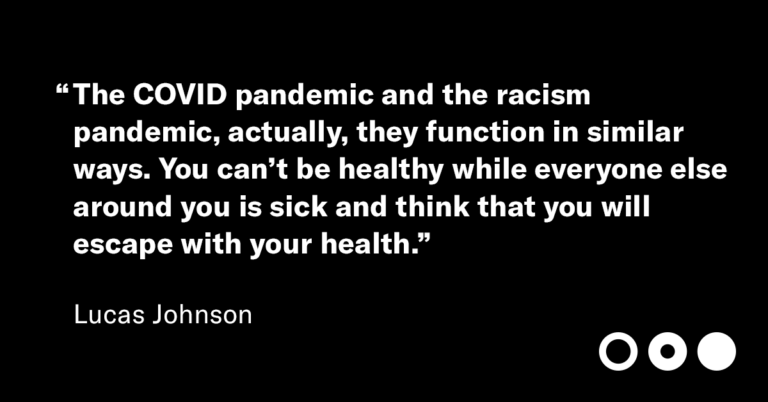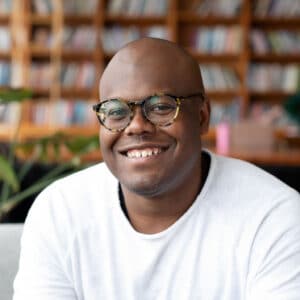Living the Questions
When no question seems big enough
With our colleague Lucas Johnson, Krista talks through the question of what questions matter for this moment. Can anyone use the word “we”? And how to begin walking forward?
Living the Questions is an occasional On Being segment where Krista muses on questions from our listening community. Submit your own at [email protected].

Guests

Lucas Johnson is Executive Vice President of Public Life & Social Healing at The On Being Project. He was previously a leader of the International Fellowship of Reconciliation, the world’s oldest interfaith peace organization. Read his full bio here.

Krista Tippett created and leads The On Being Project and hosts the On Being radio show and podcast. She’s a National Humanities Medalist, and The New York Times bestselling author of Becoming Wise: An Inquiry into the Mystery and Art of Living. Read her full bio here.
Transcript
This transcript has been lightly edited for readability.
Krista Tippett: Well, hello again.
Lucas Johnson: Hi, Krista.
Tippett: We started recording, and then we — but yeah, we’re living in a rearranged world in every way right now, including how you and I are speaking to each other.
So this Living the Questions thing is about not being scripted. And it’s about honoring questions, especially the questions we can’t answer — where it would be actually an affront to the questions themselves and the reality that they convey, to posit an answer or an opinion. You are my beloved and esteemed colleague, and you are an African-American man, and you sat at the feet of Vincent Harding and have learned from some of our great elders, and were in Ferguson, and you’ve been in many, many places in which what’s happening now in American cities, in other American cities, too, is more familiar. And, of course, there’s nothing new; that’s part of the problem. There’s nothing new. There’s a revealing, maybe. Maybe. Maybe a new light being shone. But it’s something coming to the surface again, that’s been there.
So we’ve been having editorial conversations all morning, and we’ve been interacting with people online and in our audience, in our listening community, and really coming to the conclusion that mostly we have questions. And deciding to be transparent about that. On social media, Serri had put out a call to ask people how we can accompany them — and it’s questions, mostly, including the question of why. How can this be happening. Then something really interesting to me was a woman who identifies as a black woman and the wife of a black man, the mother of three black children, and she said, all she wanted right now was silence; that her favorite show of ours is the Gordon Hempton show.
So I guess a question, an anguish, that rolls around for me is not even enough for a question. It’s the inadequacy of everything that’s been done, and all of my best motivations and desires. One of the things Resmaa Menakem said, in the conversation that I had with him that we’re just putting on the air, is how destructive it is when he gives one of his workshops, and a white woman starts crying; that that is so useless.
So, I’ve just talked a lot. I guess I would like for you to help me to think through, what are the real questions, not just to be asking, but to be living?
Johnson: Well, I appreciate a lot of what you just reflected on, and I feel that there were a couple of questions there that had resonance with me. One is this notion of what more can be said, in a moment like this. When first Ahmaud Arbery was killed, and then George Floyd — there are these calls for people to say something. And there’s this impulse to say something. And yet, at the same time, I kept feeling like, what new is there to be said? It’s all been said before, and by people more eloquent than I, and people with more capacity than I have, to speak. I think that’s a part of the grief, the idea that it needs to be said that black lives matter. It’s an annoying thing to have to say, because for me, if I’m going to reflect on black life in the relationship to the United States and the history of our country and the building of our country and the functioning of our country, we much more than matter. [laughs] We are essential. We are critical. We don’t just matter. We don’t just make a difference. And so there’s a way in which this violence, this consistent dehumanization is so self-destructive for the country as a whole. The fact that we have lived with such self-destruction is insane. So the impulse to seek silence is one that also resonates with me. There’s a way in which I relate to the rage and the frustration and the anger and, also, just to the feeling of what is necessary? What will it take?
To go back to the question that you asked, I think that this is a brilliant opportunity for us to think deeply — think profoundly, think without limitation, think with bold imagination — who are we going to be to each other. In such unrestrained ways. In such vulnerable ways. This is an opportunity for us to really reimagine the very structure and nature of our communities and the structure and nature of our lives together.
I’ve been reflecting on the fact that, during the lockdown, several European countries initiated big public works projects. They said that while people were at home, they’re going to repave roads and redo the landscape. They’re going to use this opportunity so that when we emerge from the lockdown, things will be different. So the question is, what roads do we need to pave, in the midst of this crisis?
Tippett: That this, too, is the ground beneath our feet.
Johnson: Exactly.
Tippett: You just used the word “us,” and I have been learning — I think you’ve actually called me out a few times in recent years, about throwing that word around. I like to think at a species-wide level, and I do know, I do know, and I’ve been thinking about this, too, that when history looks back on us, when time becomes history, we will be an “us,” this whole thing.
But I have been learning, and it’s been tricky, it’s been hard, to question my “we,” my “us,” and the privilege and the assumptions that are in it. Especially in racial terms, what it means to be in a white body, as opposed to what it means to be in a black body, just for starters. I feel like maybe that distinguishing, that getting conscious of the “we” that one is speaking of, may be a little bit of the work. But I actually really like it that you use the word “us.” [laughs] I think I trust your “us” more than my “us.”
Johnson: [laughs] Well, there’s an experienced us and an aspirational us, maybe. It’s hard for me to not think of Langston Hughes’s poem, where he says— “America has never been America to me” — I think the title of the poem is “America Will Be.” There’s a way in which the building of the United States, the way that we’ve constructed a narrative, has always been an exclusive narrative. It’s always been a myth that we’ve imposed upon people.
Tippett: You used the word “aspirational”; it’s also been an aspirational version of reality.
Johnson: That’s true. So the choice for leaders of black freedom struggles was to seize that aspiration and try to make that “us” a reality; try to make out of that myth something real. And that is in some ways the project of the country. The problem there, the tension there, is that we want to always rush that. Becoming a “we” and becoming an “us” is actually hard work, whether in friendships or marriages or countries.
And I’m not saying that it ought to be this hard. What we’re experiencing now is not in any way necessary. The consistent and persistent killing of black men is not necessary. It’s not something that we, as a country, as a community, should have ever accepted. And yet, because it’s happened, it imposes upon us a work to do. That’s what we have to busy ourselves with. And I think that the obvious question that many people will ask then, is, what does that work look like? What does that work mean?
Tippett: Yes. So here I am. A question that is on my heart, even if I’m not articulating it, and that I hear in what other people are saying, to me and to us and to all around us, is, where do we begin? And I guess I’m not sure: is that the right question? Is it an answerable question? Is there a better way to think about that?
Johnson: The framing that we use matters. And the way that we look at what’s happening right now, and the context that we put it in, matters. If we were treating the United States as though it were a country that just emerged on the other side of a ceasefire after a decades-old civil war, then we would be talking about rebuilding a society. We would decommission the police forces and the institutions that were involved in human rights atrocities. We would talk about what institutions need to be built that can regain the public trust. We would envision what it would take to build this country that has not yet been.
And I think that’s the scale on which we need to be imagining. We keep trying to put band-aids on something that is so fundamentally broken, from inception, that a band-aid is not going to do it. We have to be brave enough to reimagine what our lives would look like. We can’t underestimate the entrenched power of the structures and the systems that we’ve built to move us in a certain direction, a certain dehumanizing direction. We have to ask ourselves in bold ways, what does it mean for us to be community to each other? And if we’re going to be community, what should our neighborhood look like? How should our streets function? We really do have to remake this country.
Tippett: And what I want to gravitate towards, in what you just said, gives me this little sliver of hope. But I also know that I tend to look for where the hope muscle can be reasonably flexed. Speaking in Minneapolis, all you have seen in the news are the most horrific scenes and there have been horrific scenes, none of them surpassing what set all of this off, that murder (of George Floyd) that we watched. But/and, there’s also this story that’s not being shared, and I have to think this is happening in other places, too, happening at a neighborhood level, something actually new is transpiring.
I guess, what I always like about pointing at that is that it is manageable. It suggests that you can actually turn in a direction and reach out a hand or an ear. So often that question of where to begin suggests something that is so far beyond our capacities, and then people get paralyzed. But that can’t be an excuse anymore. It can’t be an excuse for not doing anything.
Johnson: No, it can’t be. Krista, you’re reminding me of something. The COVID pandemic and the racism pandemic, actually, they function in similar ways. And our response to them is very similar. On one hand we have, for a long time in the United States, thought that, contrary to the way biology functions, we can protect ourselves from disease with our individual choices from disease. But infectious disease doesn’t really respect your income or your gated community — that’s just not the way viruses function. You can’t be healthy while everyone else around you is sick and think that you will escape with your health.
And that is the way people have responded to racism. Andrew Young used to — I’m sure he still does — often tell the story about his father, who always described racism as a sickness. He would always say, “You don’t get mad at sick people, you help them get healthy. You help them get well.” We’ve known what’s been happening in our cities.
Tippett: That’s the “we” — that “we” applies to everybody.
Johnson: That “we” applies to everybody. There’s a way in which, even as black people, we can opt into a sort of blindness with respect to what’s happening in our own communities. So I’m inviting us all to an inward searching. And, listen, it’s complicated. We do these things, sometimes, because we feel like we’re just managing to hold ourselves up. We’re just managing to get our own families and our own children through school, and so on and so forth. And maybe we feel like that takes all the energy we’ve got.
I understand that. And yet, we can’t stop there. There are many of us who do have that extra capacity to ask what’s happening in North Minneapolis, to ask what’s happening to our communities, to ask who is this prosecutor who’s been elected and with this language of dehumanization and criminalization of people who are poor? What is this? What’s happening in our society?
We have chosen not to participate in our democracy, at times. And that willful ignorance has cost other people their lives. And there’s no getting around that. We have allowed ourselves to be complicit. That has to change. We’ll say, “Well, I engage politics on a national level, but I just didn’t ask what was happening with my school board, because I don’t have any kids in the school.” That’s not enough.
Tippett: Everything that’s unfolding really brings that into relief in a new way.
So that question, where to begin? Either take it apart or start to answer it?
Johnson: Well, how would you answer it?
Tippett: I don’t know. I feel really despairing about it.
Johnson: One thing, in our work, where we’re talking to communities about what it means to be in relationship with people across difference, you often find people who say, “Well, I want to get training, so I know how to talk to my staunch opponent.” They feel like everyone around them agrees with them or has the same political orientation or ideological orientation towards whatever issue. “And I just need to be prepared to talk to this clear opponent of mine without losing my cool.”
The problem with that is that is, one, it assumes a level of homogeneity around you that is thoroughly unexamined. It assumes that people around us agree — because we just don’t have the conversation with people close to us. The other problem is that you’ve got to develop the muscles to know what it’s like to listen with hospitality and to know what it means to confront someone in a way that’s inviting and loving. And to challenge them, and to invite them into the best version of themselves out of an act of love. You gotta practice doing that before you can find yourself doing it with someone who is your staunchest opponent.
I hope that people are having conversations with their loved ones about what’s happening in the country right now. I hope that people aren’t shying from the conversations they perceive to be easy, because I guarantee you that in those conversations you will find the differences in perspectives that, amplified on a large scale, become a bigger problem. I hope people will, at least as a starting point, use this as an opportunity to have conversations that we’ve long needed to have.
Tippett: You, know, Lucas, a moment ago you said that we have been complicit in people dying; that the choices to not pay attention have led to death. Maybe I could’ve been getting that from everything in the world these last years — but you said it with a clarity that became like a meditation for me. I’m gonna walk around with that. And I feel like it’s hard but people are ready to let something hard in right now. That’s a question that, if you let it penetrate, it has to change you. You have to start finding really concrete ways for that change to manifest. That’s how it’s landing with me.
Johnson: There’s a part of me that would’ve wanted to have been more hopeful and encouraging. [laughs] But I don’t think that’s what’s going on.
Tippett: No, it’s like you said, it’s not what’s going on.
Thank you.
Johnson: Thank you.